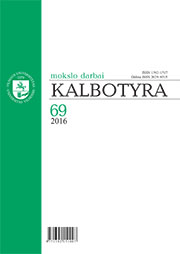(Ne)episteminis modalumas: anglų kalbos must, have to ir have got to bei jų vertimo atitikmenys lietuvių kalboje
(Non)epistemic modality: English must, have to and have got to and their correspondences in Lithuanian
Author(s): Audronė ŠolienėSubject(s): Syntax, Semantics, Pragmatics, Comparative Linguistics, Translation Studies
Published by: Vilniaus Universiteto Leidykla
Keywords: modality; epistemic; deontic; dynamic; necessity; obligation; translational correspondence; corpus-based analysis;
Summary/Abstract: This paper deals with the three types of modality – epistemic, deontic and dynamic. It examines the relation between the synchronic uses of the modal auxiliary must and the semi-modals have to and have got to as well as their Lithuanian translation correspondences (TCs) found in a bidirectional translation corpus. The study exploits quantitative and qualitative methods of research. The purpose is to find out which type of modality is most common in the use of must, have to and have got to; to establish their equivalents in Lithuanian in terms of congruent or non-congruent correspondence (Johansson 2007); and to determine how Lithuanian TCs (verbs or adverbials) correlate with different types of modality expressed. The analysis has shown that must is mostly used to convey epistemic nuances, while have to and have got to feature in non-epistemic environments. The findings show that must can boast of a great diversity of TCs. Some of them may serve as epistemic markers; others appear in deontic domains only. Have (got) to, on the other hand, is usually rendered by the modal verbs reikėti ‘need’ and turėti ‘must/have to’, which usually encode deontic modality.
Journal: Kalbotyra
- Issue Year: 2016
- Issue No: 69
- Page Range: 223-245
- Page Count: 23
- Language: Lithuanian

